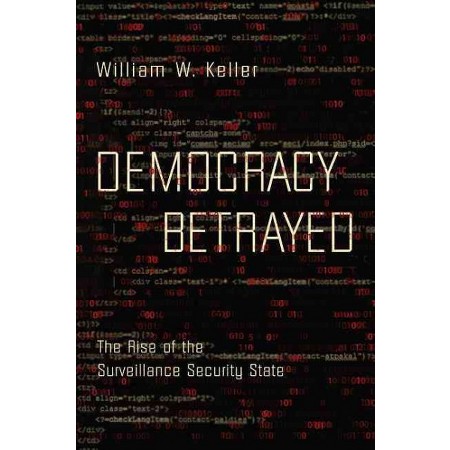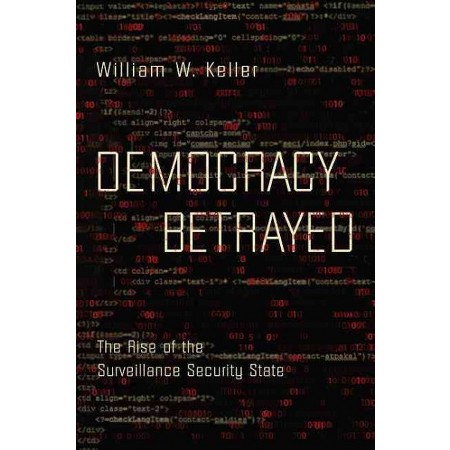By William W. Keller | (Informed Comment) | – –
James Comey is keeping a low profile these days. Not even a peep. Not even after the FBI, CIA, and NSA finally agreed on something: Russia hacked the election and Puttin, who was directly involved, hoped to install Trump as president. Comey’s silence is odd, to say the least, for a man who felt he had to interfere not once but twice in the closing days of the 2016 presidential election. In his vaguely worded letter to Congress, Comey insinuated that the politically charged wedge issue of Hilary Clinton’s emails might still come under investigation.
Candidate Trump took up the cudgel.

Democracy Betrayed: The Rise of the Surveillance Security State
He broke the news to a raucous crowd in New Hampshire: “Hillary Clinton’s corruption,” Trump said, “is on a scale we have never seen before. We must not let her take her criminal scheme into the Oval Office…this is bigger than Watergate.” The hall erupted with an ugly chorus of “Lock her up! Lock her up! Lock her up!” And that message was instantly transmitted to tens of millions of voters by MSNBC and FOX news. It’s a message we should not soon forget, and Comey still has to answer for it.
The FBI director acted against the advice of his superiors in the Justice Department. What must he have been thinking? Perhaps he thought he was above the law, or perhaps only that he could meddle in electoral politics with impunity.
Whatever his intensions, it is entirely possible that Comey’s action changed enough votes to sway the election. It could have been as few as 60,000 in the swing states. Hilary Clinton thinks so. And so do plenty of others, including House minority leader Nancy Pelosi. She said Comey’s intervention was “like a Molotov cocktail.” But the public outcry was muted at best, and the media seems to be complicit by omission. Comey dropped out of sight as the news cycle careened from Trump’s nuclear tweets to Russia’s hacking of the DNC, subsequent sanctions, and Putin’s response.
The FBI is, of course, notorious for its political machinations, dating from the 1919 Palmer Raids when 10,000 “slackers” were arrested, to McCarthyism in the 1950s, and the secret Cointelpro Programs of the 1960s—that sought to stifle peaceful protest and harass civil rights and anti-Vietnam War leaders. Hoover packed Congressional Committees with FBI agents, and kept allegedly incriminating files on members of Congress in his inner offer. During his half-century as director, it seemed, the FBI could do no wrong.
After Hoover’s death in 1972, Congress stiffened it spine, legislating a 10-year term limit for the FBI director and empowering the Church Committee to investigate the FBI and publish its most secret documents. Top secret papers described illegal activities like “black bag” break-in jobs, targeting protest groups for infiltration and disruption, and widespread warrantless surveillance of U.S. citizens.
In the closing decades of the 20th century it seemed as though the FBI had been brought to heal by superior power emanating from the Senate Select Committee to Study Governmental Operations with Respect to Intelligence Activities.
That was before, however, the 9/11 when the FBI was predominately a law enforcement agency. The Bureau has since built up it counterterror mission. It has dramatically increased its surveillance of Americans and the Internet, its infiltration of groups, and its futile attempts to locate “lone wolf” terrorists before they can commit their crimes. FBI manpower and budgets have increased precipitously.
But make no mistake: There are good reasons to keep a wary eye on the intelligence agency over which Comey presides. The FBI now operates some 15,000 “confidential informants.” They are permitted to engage in “otherwise illegal activity” (i.e., break the law), indeed 5,939 times in 2012, the last year for which statistics are available. In addition to his electioneering, Comey is a leading advocate of Internet-based government surveillance. He would mandate “back doors” or “special access” into iPhones and all kinds of applications—enabling the FBI to spy on criminals as well as unwitting Americans. Never mind that Internet experts at MIT and in Silicon Valley have demonstrated unequivocally that “back doors” weaken encryption, introducing vulnerabilities that criminals and state-based hackers—say the Russians or the Chinese, for example—can exploit.
All this pales, however, in comparison to Comey’s electoral malfeasance. The FBI is first and foremost a police organization with broad internal security and intelligence powers. As such it must continuously be monitored and brought to account, especially when it takes liberties with our democratic ideals and institutions.
So it’s clear, Director Comey has to go. The media needs to focus again the electoral misconduct of the FBI director so it never happens again. And so does President Obama. This should be his last act as president. He is the only one in a position to send an unmistakable message to law enforcement, the Intelligence Community, and all other appointed officials to keep their hand off the elections—because it’s hallowed ground.
William W. Keller worked as a security analyst for the U.S. Congress for ten years, as executive director of the Center for International Studies at MIT, and as professor and director of security centers at the Universities of Pittsburgh and Georgia. He is the author and editor of seven books and has written extensively about the FBI, defense technology, the intelligence community, and the arms trade. His latest book is Democracy Betrayed: The Rise of the Surveillance Security State, from Counterpoint Press.



 © 2025 All Rights Reserved
© 2025 All Rights Reserved